Peter MALONE
Saturday, 18 September 2021 19:57
Last Cab to Darwin
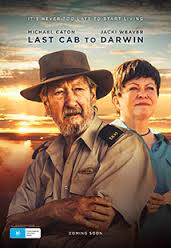
LAST CAB TO DARWIN
Australia, 2015, 125 minutes, Colour.
Michael Caton, Ningali Lawford, Mark Coles Smith, Emma Hamilton, Leah Purcelll, Alan Dukes, John Howard, David Field, Brendan Cowell.
Directed by Jeremy Sims.
Publicity in discussions about this film indicate that the main theme is euthanasia. Actually, the focus is on assisted suicide. But the buzz about the film does not indicate the other very significant theme, aborigines in Australian society, especially in the outback towns like Broken Hill and on the road between Broken Hill, Oodnadatta, Alice Springs, Darwin.
The theme of assisted suicide has had quite some significance in Australian discussions, and still has, especially past projected legislation in the Northern Territory and the work of advocate, Philip Nitschke – and audiences will probably think that the character of Dr Nicole Farmer, played by Jacki Weaver, is based on him and his advocacies.
Prospective audiences for the film will often have strong and fixed views, for and against, assisted suicide. This drama offers a great deal to think about, a great deal to feel about.
The driver of the last cab to Darwin is Rex, an old taxi driver in Broken Hill who has never really been outside the city, never seen the sea. Now in his 70s, he has a terminal cancer and is given about three months to live. Michael Caton has been something of an icon in Australian film and television, especially his role as the dad in The Castle. His performance as Rex will also be iconic, an imposing figure in his way, old, grizzled, alone, sardonic, driving his taxi and knowing most people, fond of a beer, fond of his pet dog, Dog, in something of a relationship with Polly (Ningali Lawford) who lives across the street.
Last Cab has a lot of shots of Broken Hill, the centre of the city, the surroundings, the mining atmosphere, the desert. And, of course, there are a lot of characters, the types you might expect working on the roads, builders, congregating at the pub, some sly winks to the barmaid – and more – a group of ocker men. These are Rex’s friends. He relates well to them, but does not share a great deal of his inner self with them.
When Rex comes upon a news item about the possibilities of a machine to help with suicide being developed in Darwin, he phones in – and everybody in the city hears it on talkback radio. He decides then to drive his taxi to Darwin, to meet with Dr Farmer and put an end to his life.
A great deal of the film, perhaps most of the film, takes place on the road, giving audiences at home and internationally, a close-up of the Australian outback, the variety of landscapes, the desert, the lone tree with the skeletons of feral cats hanging, the isolated pubs, the road trains – knocking up pebbles which break windscreens, the tourism at Daiy Waters, the isolated whites, the individuals and groups of aborigines…
The themes of black and white Australians is to the fore in the relationship between Rex and Polly, Polly’s bringing all her relatives down to stay in her house and causing some mayhem with Rex’s possessions, a young man on the road, Tilly (Mark Coles Smith), a lively lad with football potential, married with children, but reckless, drinking, in trouble, who helps Rex and decides to travel with him to Darwin. Rex intervenes in Darwin to persuade a local coach to give Tilley a chance for a tryout for playing in the Australian rules team.
There are some poignant moments for Rex when he visits Daly Waters and sees a photo of his parents on the wall, his mother and father who met there, his father working on the air strip. When he collapses, being very weak from the exertion of the trip and the anxieties in going to Darwin, a young barmaid from England, Julie (Emma Hamilton) trained as a nurse, volunteers to look after him.
Rex, in Darwin, finds that going through with the procedure is not easy at all. There are issues of legislation. There are issues of consent – the machine asking the person who wants to die to signal consent on a computer, and asking three questions, then releasing the lethal dose. Consent is also required from a psychiatrist as well is a specialist in the terminal cancer.
While this leads to complications about the death, it also offers an opportunity for Rex to reflect on his life, break through something of his isolation, especially encouraged by Julie, acknowledge his love for Polly, realise something in a zest for life, his hopes for Tilley’s success, that dying and consenting to die is certainly not easy for most people.
With such significant themes – although the original play, written by Reg Cribb who collaborated for the screenplay with director Jeremy Sims – was written almost a decade earlier, there are no pat answers either way about the challenge of assisted suicide. The film asks for principled reflection, and it for offers a great deal of possibility for empathy. Many audiences will still not be certain as to their final opinion.
1. The title? Evocative? Indication of themes?
2. The origins in a play, its being opened up? The 2005 origins of the play, the Northern Territory, legislation, euthanasia changes?
3. Assisted suicide? Audiences pro and con? Thinking about the issue, feeling about the issue, identifying with characters or not?
4. The importance of the aboriginal themes, the history of the aborigines, in the outback and Northern Territory? In Broken Hill? In Oodnadatta, the settlements? Bars and motels, drink, the Long Grasses? Relationships? Marriage and children? Football? Equality?
5. Michael Caton as Rex, age, driving the taxi? Alone in his house, Dog,Polly calling out about the garbage, bringing him breakfast, the neighbour’s disapproval? The relationship? His work, the variety passengers in the taxi? Going to the doctor, the views of the specialist? Given three months to live? The background of his friends, Col, Simmo, Dougie? Simmo and the barmaid? Drinking?
6. The city, the detail? The context of the story?
7. To the airport, listening to the radio, the passenger and his clients, the information on assisted suicide and the talkback, his stopping and phoning, everybody hearing him?
8. His decision, to drive to Darwin, the variety of reactions, his phoning Dr Farmer? The reaction, his expectations, her expectations?
9. Dr Farmer, her Darwin practice, developments for assisted suicide? Issues of law, the range of consents required, the machine, linked to the computer, the questions?
10. Rex on the road, the different terrains, the range of scenery, variety, the road train and its speed, breaking the windscreen, the feral cats hanging from the trees? Oodnadatta, the children following the car, Tilly and his fixing the windscreen, the barmaid and the money, Tilly’s wife and her reaction?
11. Tilly and his debts, stealing the money, his being bashed, Rex confronting the attackers, Tilly hiding the money in his mouth? Driving with him, talking, sleeping, telling his story, the AFL, the possibility of his playing, his marrying, his children?
12. The views of Alice Springs, the exercise of bias towards aborigines in motels, Tilly going to the Todd River, driving?
13. Daly Waters, Rex and his memories, the story of his parents, the planes and the airport runway, his having the photo, seeing it in the bar, the discussions with Julie? The show, the compere and his patter, the tourists, Tilly and his dance? Rex sick, vomiting, Julie caring for him? Rex’s desperation and trying to crash the car?
14. Julie and Tilly both going to Darwin, after Rex finding them in the back of the car, the sexual encounter? Meeting Dr Farmer, her assistant? The discussions, the situation, the explanation about the machine, Rex wanting to die?
15. Julie and her story, as a nurse, England, wanting the sun, going to the Northern Territory? Quitting her job in Daly Waters? Helping Rex, changing, care? Going to see the sea with Rex? Tilly and Rex pleading for him with the football coach, Tilly training, disappearing, into the Long Grass, drinking, Rex finding him? Julie and her discovery that Tilly was married? Confronting him?
16. Dr Farmer, her care, the discussions and arguments, Rex as a cause rather than more personal involvement? Her trying to get the required consents, the psychologist, the specialist, the phone calls, refusals, final success?
17. Rex with the machine, Julie turning it on, the computer questions and clicking? The dose flowing – and Rex stopping it?
18. The farewell, to Julie, Tilly and his playing, his wife watching him? Dr Farmer and her cause?k
19. Julie urging Rex to contact Polly, the phone calls, Polly and her family moving in, the squabbles, love for Rex, the final phone calls, welcoming Rex back? His friends?
20. The prospects for Rex, living, dying?
Published in Movie Reviews
Published in
Movie Reviews
Tagged under
Saturday, 18 September 2021 19:57
Blue Room, The/ La Chambre Bleue
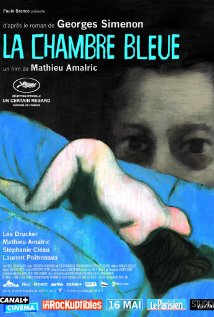
THE BLUE ROOM/ LA CHAMBRE BLEUE
France, 2014, 76 minutes, Colour.
Mathieu Amalric, Lea Drucker, Stephanie Cleaut.
Directed by Mathieu Amalric.
The Blue Room is based on a story by crime writer George Simenon, very popular with his series of Inspector Maigret stories. This is not one of them, though it involves crime.
One of the reasons the film is interesting is that it stars much Mathiue Amalric who was also co-screenwriter as well as director.
The film has brief running time and, in fact, a lot of the action takes place off-screen with the audience having to supply through imagination and response to clues as to what has actually happened.
It is clear from the outset that an affair is going on, in a blue room, Julien (Amalric) and Esther (Stephanie Cleaut) are both married, she not concerned about the affair because her husband is seriously ill, he somewhat edgy because he has a wife and child.
There are some scenes showing the domestic arrangements, especially for Julien, including a scene at the beach. But, very quickly, he is being interrogated by the police. During this interrogation there are many flashbacks. It emerges – but is not seen – that as Esther’s husband is dead, that Julien’s wife is dead. Have they murdered their partners?
Then, rather quickly, we are in court, where quite a number of witnesses give their opinions, character opinions, hypotheses and speculation, some factual testimony, not the kind of thing English-speaking audiences are used to in court proceedings, Julien and Esther come together in the courtroom – and then a verdict is given and sentence.
The audience does not have all that much time to deal with what is going on, their response to the characters and situations, moral judgements and assessments, which means that the effect of the drama is tantalising rather than satisfying, making a demand on the audience as the film is ending and after the film is over to make sense of what it has just experienced.
1. Crime and romance? Passion? Based on the Georges Simenon story?
2. The brevity of the film, its impact? Suggestions of activity off-screen? A film of talking, dialogue?
3. The title, the room, the apartment, the sexual behaviour, the windows, looking out, the maid and her cleaning?
4. Julien, his job, his relationship with his wife, child? The affair? The motivation? Esther’s husband? The scenes with his wife and child, on the beach? His love for his family, yet the betrayal? The death of the husband? The death of the wife? The arrest, the police interrogations, the insertion of the flashbacks? The relationship with Esther, her interrogation? In the court, listening, the testimony, the decision, the sentence?
5. Esther in herself, with Julien, the sexual relationship, provocative, asking whether they could have a life together, the pharmacy, her husband, his illness, his death, the autopsy, the results?
6. The character of the husband, the relationship, illness? Julien’s wife, her death?
7. The arrest, interrogations, reconstruction, the range of testimony, the giving of evidence, the judgements on characters? Observation, witness, the bottles of jam…? The prosecutors? The judge?
8. The finale, the sentence, so much happening off-screen and the audience supplying information, response? Their life sentence and being together always?
Published in Movie Reviews
Published in
Movie Reviews
Tagged under
Saturday, 18 September 2021 19:57
Irrational Man
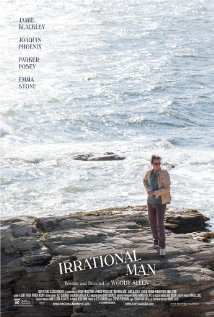
IRRATIONAL MAN
US, 2015, 95 minutes, Colour.
Joaquin Phoenix, Emma Stone, Parker Posey, Jamie Blackley, Betsy Aidem, Ethan Phillips.
Directed by Woody Allen.
A word of warning before the review. If you have not seen the film and don’t know anything about the plot, don’t continue reading here but go and see the film and be surprised. This is a review for those who have seen the film.
Released some months before Woody Alan turns 80, Irrational Man does not seem to be the work of an elderly director or writer. Certainly, it will remind audiences at a number of films from Allen’s CV, something which has annoyed critics who accuse him of repeating himself, but for those who appreciate his films, why not rework themes?
And one of the criticisms that Woody Ellen has had to face over the years is that some of his films are funny and some people think that they are all supposed to be funny and, if not, there is something wrong with them. And, Irrational Man, is a case in point. Allen is not trying to be funny.
Another complaint is that the film has too much philosophy in it – as if that could really be a problem. Yes, there are philosophical questions because the leading character is a Professor of philosophy in an American college and we see him quite a number of times in the classroom, specifically mentioning philosophers like Conte, Kierkegaard, Edmund Husserl, phenomenology and existentialism, Jean-Paul? Sartre, Simone de Beauvoir, Martin Heidegger. Allen certainly remembers his history of philosophy. Which indicates tones of depth in the exploration of philosophical questions.
In recent years Joaquin Phoenix has been playing offbeat roles, Inherent Vice, Her, The Master, and here Allen provides him with another one. He is Abe, arriving at a college, subject of curiosity, middle-aged with a very evident paunch, a reputation for relationships with his students, and eager do-gooder and traveller to countries in distress in his younger days, but now a touch dissipated and a touch world-weary as well is impotent.
He first attracts the attention of another lecturer, Parker Posey, dissatisfied in her marriage and eager to ingratiate herself with Abe. That doesn’t quite work out, though she tries hard.
More satisfying is the admiration of a young student, Jill, Emma Stone, who appeared in Woody Allen’s previous film, Magic in the Moonlight. She seems a sensible young woman, an eager philosophy student, flattered when the professor praises her assignment – but then preoccupied with him, talking about nothing else but him, more than infatuated with him, enjoying his company, discussions, and falling in love.
In an innocent incident, listening in to a conversation amongst a group in a diner, leads to consequences that Jill certainly did not anticipate, nor did Abe, as he gets angry with the judge who is partial, refusing custody of children to a deserving mother, and, reading Dostoevsky and Crime and Punishment, with annotations, he sets out to rectify the situation, finding what he thinks is a moral freedom but which is an amoral freedom, which not only has an effect on himself but also on Jill and her integrity.
Which means that audiences for and against the film will be going back to Woody Allen’s 1989 classic, Crimes and Misdemeanours, as well as thinking about his 2004 Match Point, issues of principle, issues of responsibility, issues of conscience, and deviation in conscience.
So, not a funny Woody Allen film, but very well-written, well-acted, an evocative jazz score as well as classical excerpts, and, for this reviewer, one of Woody Allen’s best.
1. A Woody Allen film? Late Woody Allen, Woody Allen in his late 70s? His long career? His reputation? The combination of philosophy, romance, crime and self-justification? The quality of the language, the lines? The jazz score and its effect? The classical score and the piano recitals?
2. Providence, Rhode Island, the college, the city, the buildings, classrooms, offices, apartments, restaurants? The sea and the beach? The feel of Providence?
3. The voice-over for each of the characters, the tone of the voices, the explanations, explaining themselves, explaining others, anticipation of what was to happen? Tone, reflection? Self-explanation? Self-justification?
4. The title, rationality and irrationality? The importance of the mind, the brain, reacting with the head? The contrast with the heart, emotions, the gut? Rationality and philosophy, the variety of stances, Abe and his list of philosophers, treating them in class, Conte and lies and honesty, Kierkegaard and anxiety, Christian background? Edmund Husserl and phenomenology? The existential philosophers? Jean-Paul? Sartre and hell as others, Simone de Beauvoir and the status of women, Martin Heidegger and fascism?
5. Abe’s previous story: middle age, his international experiences, the variety of jobs, always reading, his academic career, his affairs with the students, going to Bangladesh and other world situations, wanting to do good, to affect some change? Philosophy, his classes? The new college, his reputation, his manner?
6. Abe’s arrival, driving, enquiries, the interview with the official, the accommodation? The encounter with Rita, her husband, talking with her? The range of classes and topics, his students? Talking with Jill? Praising her for her essay? His being cautious? Their time together, outings, sharing, the bond? Her piano recital? His attitude towards Roy? The encounter with Rita and his impotence? Her gift of the whiskey? Reluctantly going to the party, the discussions about Russian roulette, the ignorant girl, the demonstration, his getting the gun, playing roulette, everybody’s reactions, Jill’s reaction?
7. The portrait of Jill, with her parents, her love for Roy, her protestations? Love for philosophy, her essay, Abe’s comments, being flattered? Her explanation in the voice-over? Liking Abe, sharing with him, the walks, affection? Roy and his exasperation with her always talking about Abe? The family meals and her talk? Jill breaking off with Roy, his feeling hurt?
8. In the diner, listening to the discussion in the next booth, the story, adoption, custody, the judge, his bias?
9. Abe, sleeping, awake, the decision about the judge, his coming alive with his decision, Rita and his regaining of potency? Going to the lab, the encounter with April and his justifying himself? The poison? Following the judge, exchanging the drinks on the park bench? Buying the paper, his reaction to the death? The news, talking things over with Jill? Saying it was like playing a hand at poker and his not revealing anything? His satisfaction, self-justification, the world a better place without the judge?
10. Jill, her reaction, shock, having the meal with Abe, celebrating the judge’s death, her wanting the sexual relationship, happy, both feeling alive?
11. The meal with her parents, Abe present, the variety of theories, her mother and father, the difference between cyanide and arsenic? The mystery, the theories of how the poison got in the drink? The variety of suspects, the police interrogating everyone? Jill in Abe’s office, finding the copy of Crime and Punishment, Dostoevsky’s philosophy, Abe’s annotations?
12. Jill, thinking things through, the realisation about the poison, Rita and her theory about Abe, the horseriding friend and her theory?
13. Jill, caution, questioning Abe, getting more information, the fact that Rita’s husband saw Abe in the morning, April’s information about the key? Building up to the confrontation?
14. Moral stances, Jill and integrity, ready to report Abe?
15. Abe’s moral stance, justification, explanations, righteous, Raskolnikov and Crime and Punishment, the world a better place?
16. Rita, Abe going to Spain, her wanting to go with him, the confrontation with her husband in the car?
17. Jill, going to her music lesson, a quiet Saturday, Abe fixing the elevator, is explanation and reasons for killing Jill, accosting Jill, the clash, the fight, his trying to kill her in the lift well, his tripping on the torch, falling?
18. Jill on the beach, reflecting on lessons, the rational approach in class, the irrational aspects, non-rational, yet the experience better than a textbook or lesson? Reconciliation with Roy?
19. Woody Allen in his late 70s, getting together all his themes and style, humorous and serious?
Published in Movie Reviews
Published in
Movie Reviews
Tagged under
Saturday, 18 September 2021 19:57
5 Flights Up
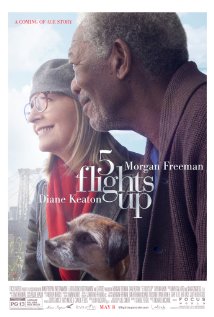
5 FLIGHTS UP
US, 2014, 92 minutes, Colour.
Morgan Freeman, Diane Keaton, Cynthia Nixon, Clare van der Boom, Korey Jackson, Josh Pais.
Directed by Richard Loncraine.
When we see that the stars are Morgan Freeman (who will be 80 in 2017) and Diane Keaton (70 in 2016), we know who the demographic is for this light comedy drama. It is for those who are at home in the Best Exotic Marigold Hotel or saw and enjoyed Shirley Mac Laine and Christopher Plummer in Elsa and Fred. It is somewhat slighter than these films but it is definitely geared for that older audience. (For those who want to be dismayed by attitudes of younger audiences, have a glance at the blog entries on the Internet Movie Database and see how There is a low frustration tolerance for this kind of story of “oldies” - boring - with the worry that this might apply not only to the movies but also to responses in real life!)
The title indicates some strain and effort on staircases, especially when we discover that there is no elevator in the apartment block where our married couple, married for 40 years, have lived all that time. Morgan Freeman’s Alex is a painter but is finding getting up the steps rather demanding – as does the couple’s dog, Dorothy, who is in more of a state of collapse than Alex. Diane Keaton’s Ruth is sympathetic to Alex and the stress and has decided that it would be better if they moved, sold their apartment, search for somewhere else to live which would be more convenient and congenial. Alex is not so sure.
In fact, Alex is less sure when Ruth’s niece, Lily (Cynthia Nixon) a real estate agent, with incessant patter, is enthusiastic about having a day when people will come to view the apartment. Anybody who has had to sell a house or buy a house and experienced people coming in to inspect places will respond with laughter and with exasperation at the range of people who come to have a look – some with no intention of buying but just to see how the other half live. And all the time, the niece is playing up to the potential clients, repeating her spiel, with incessant enthusiasm. Ruth manages while Alex gets rather sick of it all, except for little girl with whom he has an enjoyable chat.
It is hoped that dog-lovers will excuse talking about Dorothy’s crisis only now but the apartment sale seems to have priority. Alex and Ruth hurry her to the vet, and they (and us) will be gobsmacked at the price of treating a dog in New York City let alone the thousands of dollars required for surgery. Dorothy has the surgery and there are continually anxious phone calls to the vet to find out whether there is any progress. Dog-lovers will find this all much more’s suspenseful than whether the couple are able to sell their apartment or not!
While in the taxi, there is gridlock in the city, a tanker lodged on a bridge and the driver escaping, of Middle-Eastern? appearance, with rapid conclusions that he is a terrorist, compounded by the chatter of the TV hosts which serves as a thread throughout the film, illustrating New Yorker phobias, suspicions and wariness (as one girl in a shop says “I don’t speak Muslim”), and a great concern that this kind of terrorism will have a detrimental effect on property prices in the area – so, some ironic touches of satire throughout the film.
The other aspect is that Ruth decides they should look up advertisements, go to scout out a few places themselves, find an apartment that they really like, hear the crankiness of the owners, the spiel of the agent – and the niece turning up and intervening, threatening the law, eager to get her percentage…
Since this is a film for the elderly audience, it is certainly no good having a sad ending and everybody going glumly back out of the cinema, so, without spoiling what happens, audiences will leave the cinema after 5 Flights Up feeling happy and even relieved.
1. New York story, the visuals, the world of seniors, the terrorist situation and traffic blocks, the search for new apartment?
2. The apartment, the interiors, the insertion of the flashbacks occurring within the apartment? The streets, the vet and the animal hospital, the range of new apartments? The feel of New York City, the look? The musical score and the songs?
3. The title, the focus, the steps, no lift, age and difficulties in movement, tiring? And the dog?
4. Alex and Ruth, married for 40 years, the racial difficulties at the time of the wedding, Ruth’s mother and her prejudice? The Vietnam background and Alex not wanting to talk about it? The artist? Ruth, the teacher? The attempts to have children, Ruth’s sense of failure? The retirement, Alex giving her the gift of the dog? The quality of their life together, love for each other?
5. Alex, Morgan Freeman and his presence, his voice – and the actor portraying his younger equivalent? Age, collecting the paper, walking the dog, the stress of the steps, awkward with the phone, the Internet? His art, the paintings in the apartment, the portraits, especially of Ruth? Dorothy unwell, taking her to the vet, in the taxi, the traffic congestion? The surgery, the discussions with the doctor, costs? Phone calls and checking? The visit? Hope for Dorothy’s recovery?
6. Diane Keaton’s Ruth, her manner, presence, style? The combination with Morgan Freeman? In the past, teacher, available for modelling, Alex and her glasses, the painting? Retirement, the gift of the dog? Her inability to have children, her sense of disappointment? Alex telling her that the schoolchildren were children? Adept at Googling and the Internet?
7. The decision to sell the apartment, the reasons? Lily, neice, family background, as an agent, the visits, talking, Alex’s reaction? Setting up the visits, early in the morning, trying to sell the apartments, the different spiels, language, repetition, slogans, engaging with the potential clients? The continued phone calls, wheeler-dealing?
8. The visitors, the dog ladies and their relationship, later finding out they wanted to adopt, the stern woman, the training of the dog? the psychologist and her wanting to rearrange the apartment? The woman who liked just to look at the apartments and her sardonic comments? The mother lying on the bed, the
friendly little daughter and discussions with Alex? The initial couple, on the phone, critical? The various bids and phone calls?
9. The traffic situation, on the television, pervading the film, New Yorkers and the attitude towards terrorists, the woman saying that the accused had robbed her, her lies, ignorance, “not talking Muslim”? Searching for the bombs? The tanker, on the bridge, the approach of the police? The continued patter of the television commentators, even though they did not know what was happening?
10. Alex and Ruth, the desire for a new apartment, looking at the papers, the visits, the first apartment, not liking it, the second apartment, the agent, the space, decision to buy?
11. The range of bids, time limits, Lily and her pressure, an agent and wanting the commission?
12. Alex and Ruth, the visit, the wary owners, Lily pulling legal rank, the television news, discovering the accused, his kneeling on the ground? Alex not signing the document? Alex and his comments on New Yorkers, terrorism, upset about traffic being blocked, apartment prices going up and down? His decision not to sign?
13. Lily, the anger, walking away?
14. Alex and Ruth, continuing their life, rediscovering their life, collecting Dorothy, happy couple and their quality of life?
Published in Movie Reviews
Published in
Movie Reviews
Tagged under
Saturday, 18 September 2021 19:57
Eklavya: the Royal Guard
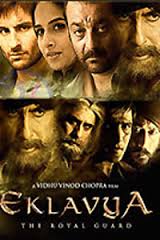
EKLAVYA: THE ROYAL GUARD
India, 2007, 105 minutes, Colour.
Amitabh Bachchan, Sanjay Dutt, Saif Ali Khan.
Directed by Vidhu Vinod Chopra.
Films from India, from Bollywood or the more serious Bengali film-makers of Eastern India, are getting more attention around the world these days. With the biggest number of films made in any country in the world, India could flood the market. The question arises: which films make more impact for a non-Indian audience? Eklavya is one that can be considered.
This is a lavish production, widescreen and colour, artfully composed images, atmospheric score rather than an emphasis on songs (which are included but sometimes as background), emotional force with love, violence and betrayal.
At first one thinks that the tale is set in ancient, even mythological times, as a mother tells her son the story of the guard Eklavya who was the best archer in the land. The envious prince that he guarded asked him to obey him in one command: he was to chop off his thumb, that eliminating himself as a rival to the prince as an archer. Obedient, he did this.
However, the setting is actually contemporary. We realise that the story has been told to the modern Eklavya who is now a royal guard. Actually, the surface looks very dignified, the emotions very moving as the queen is dying with her grieving husband at her bedside. And then…
There is plenty of melodrama and some unexpected plot turns (for those brought up in the demanding moral tradition of the American Motion Picture Code) as the story turns into the equivalent of Greek or Shakespearean tragedy – of the revenge and blood-spilling kind. Innocent-looking characters surprise us with their malice or their motives. But, Eklavya stands firm. Finally, he is presented with some moral dilemmas himself, with questions about where his loyalties lie – with the old king who is murdered, with his hero son who has more bonds with Eklavya than he knows…
It is another world and Eklavya takes us into its exotic political and social dimensions as well as the religious rituals and mythical traditions.
Published in Movie Reviews
Published in
Movie Reviews
Tagged under
Saturday, 18 September 2021 19:57
Bamako
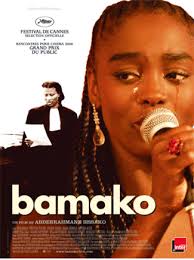
BAMAKO
Mali, 2006, 115 minutes, Colour.
Directed by Abderrahmane Sissako.
Bamako provides quite a demanding challenge to its audiences.
Director Abderrahmane Sissako has received many awards for his two previous films, Heremakono and La Vie sur Terre (including an Ecumenical Award). They have been described as poetic and political. Those are the words that are relevant to Bamako.
On the poetic side, the audience is immersed in the day-to-day detail of life in the capital of Mali. It ranges from the markets, homes to night clubs. Lots of the characters are found sitting around, observing life and people, part of the local African colour. Suddenly the credits and scenes from a Western set in Timbuktu starring Danny Glover are parachuted in to disconcert us – Westerns in Mali? Shootouts and the sudden deaths of innocent bystanders?
On the political side, the focus is on an outside court (the legal representatives dressed in traditional garb) with judges presiding over a hearing where some locals are making an appeal against the International Monetary Fund and the World Bank. The action moves between the court action and the events in the lives of the characters – especially a young singer at a club whose marriage is under stress.
The court sequences offer quite a number of speeches, both formal and informal (especially when an old man does not know the protocols of procedure and feels he must speech when he feels the urge). The speeches are defences of Africa, condemnations of colonialism and the highlighting of the disastrous consequences which still determine the fates of most African countries. Many examples are offered to critique the effects of globalisation as well as the presumptuous presuppositions of the international money organisations. A French barrister does get the opportunity to make a speech in the defence of these institutions, but it is clear where the intellectual as well as the emotional arguments are leading.
This is a cinematically eloquent piece of African storytelling but even more eloquent polemical challenge to the West and its governments and business organisations.
Published in Movie Reviews
Published in
Movie Reviews
Tagged under
Saturday, 18 September 2021 19:57
Zion and his Brother
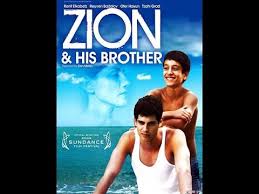
ZION AND HIS BROTHER/ ZION VE AHAV
Israel, 2009, 84 minutes, Colour.
Reuven Badalov, Ofer Hayoun, Ronit Elkabetz, Tzahi Grad.
Directed by Eran Merav.
This is a brief Israeli film, a family story, particularly Israeli but one with universal themes, a story which could be told in many different cultures.
Zion is a young boy, the second son, dominated in many ways by his older brother who is in mid-adolescence, rebellious, violent, sexually active, yet still immature. The older brother has a responsibility for his younger brother but is sometimes resentful of it. There are various domestic sequences, going to a local phone to take calls from their absent father, interactions with their mother who is seen as something of a loser and who has taken up with a local builder, who plans to take the family to a new home.
The crisis comes when Zion thinks that a young African boy from school has stolen his sneakers and tries to get them back – and his brother being particularly brutal, the boy fleeing and getting hit by an oncoming train, something which does not bother the older brother but preys on the conscience of Zion.
The two actors did not have a lot of screen experience but their mother is played by prominent Israeli actress, Ronit Elkabetz.
1. An Israeli story, but a story that could be told anywhere? The Israeli settings? Tel Aviv? The city, the suburbs, the poorer area, homes, school, building sites, the railway, the sea, Mc Donald’s? The musical score?
2. A family story, the absent father and his phone calls, his sons and their talking with him, his concern? The mother, separated, her slack life, her boyfriends, going out with them, not having enough money, yet her sons, devotion to Zion, concern about Meir?
3. The two boys, their ages, the older and his care for the younger, sharing the room, sharing many episodes? Yet the older becoming an adolescent, not wanting responsibility for his brother, his attitude towards his mother, condemning her? Talking on the phone with his father? Tough, attitudes, with the girls, sex, with his friends, the girl in the car, her refusal, his pushing her out? The later confrontation, the gun at her head, the joke, her apology?
4. Zion, his age, with his brother, the preoccupation with the dentist, his not wanting to go, his fears, eventually going? Love for his mother? Her concern about the dentist? His attitude towards his father, the phone calls? His attitude towards Eli? His sneakers, disappearance, saying he did not lose them? Seeing the African boy, the confrontation? Riding on the bike with his brother, the brother and his brutality towards the boy, bashing him, the boy rushing away, towards the train, his being killed?
5. Zion as a loner, wanting his own room? Taking refuge in the sea? The possibility of moving, with his mother and Eli at the building site? The suggestion that he go to the centre and then come to the apartment when ready? The meal at Mc Donald’s, his helping on the building site, then his brutal comment to Eli about his mother not loving him? His change of heart?
6. The older brother, his behaviour, care for his brother, the brutality, his disappearance, the confrontation with the girl? His future?
7. The mother, the boyfriend, reconciling, the boyfriend and his work, prepared to be a foster father, the future?
8. Zion, upset at the death of the boy, the discussions about him, his conscience, his brother’s callous attitude, the father coming to the school and asking if anyone knew his son, Zion going to the father, carrying the pot plants? His future?
Published in Movie Reviews
Published in
Movie Reviews
Tagged under
Saturday, 18 September 2021 19:57
Rainbow on the River
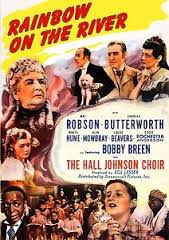
RAINBOW ON THE RIVER
US, 1936, 87 minutes, Black and white.
Bobby Breen, Louise Beavers, May Robson, Charles Butterworth, Alan Mowbray, Benita Hume, Henry O' Neill.
Directed by Kurt Neurmann.
Rainbow on the River is a pleasant family oriented film of the mid 1930s, capitalising on the popularity of the child singer, Bobby Breen. This is his second of his films, made when he was nine. He had a strong and striking voice, popular in films, but also on radio, singing with such stars as Deanna Durban. He made his last film in 1942 as his voice was breaking and he moved out of cinema to concentrate on a nightclub singing act.
This story, based on a novel Toinnete’s Philip, is set in New Orleans after the end of the Civil War. A young lad is being looked after by an emancipated slave, played with great strength and emotion by Louise Beavers. She has ambitions for his education and the local priest, played by Henry O’ Neill, discovers that the boy has relatives in New York City and he is sent there. The family is unwelcoming, exploiting the young boy, but he ultimately charms his grandmother, May Robson. Alan Mowbray portrays his scheming uncle.
Eventually, he charms his crotchety grandmother and returns to the South.
The film is billed as a musical and Bobby Breen has quite a number of songs including his version of Stephen Foster’s Camptown Races. However, he has an opportunity to sing the title song three times, first a lonely version, the second with all the children in New York and his playing the banjo and, finally, with great sentiment as he rides again in a carriage with his grandmother and with Toinnette, the blacks in cotton fields even joining in a choral version of the song as the film comes to an end.
Not widely seen the film, pleasant – a reminder of the talent of Bobby Breen who has been largely forgotten.
Published in Movie Reviews
Published in
Movie Reviews
Tagged under
Saturday, 18 September 2021 19:57
Desperado, The

THE DESPERADO
US, 1954, 80 minutes, black and white.
Wayne Morris, James Lydon, Beverley Garland, Rayford Barnes, Dabbs Greer, Lee van Cleef, Nestor Paiva.
Directed by Thomas Carr.
The Desperado is a small scale Western of the mid-1950s, filmed in black-and-white. It was a small star vehicle for Wayne Morris who had been a lead at Warner Brothers during the 1930s and 1940s – but who was to die aged 45 in 1959. It was also a star vehicle for James (Jimmy) Lydon who had been popular in the Henry Aldrich series. The leading lady was Beverley Garland and Lee van Cleef appears twice, as twins.
The setting is Texas in the early 1870s, ruled by a corrupt governor, Davis, and hounded by his special police, nicknamed the Blue Bellies, who raided murdered and tortured. The townspeople rebel against them, especially a young man, played by James Lydon, who escapes with his friend, Ray (Rayford Barnes), and they come across a gunfighter, Wayne Morris.
The young man returns home when he hears that his father has been killed, confronting some of the Blue Bellies. They are killed in cold blood by his former friend who has come to the authorities to get a reward for the desperado.
The friend lies and a price is put on the young man’s head. In the meantime he meets a twin who tries to steal his horse, and kills him, later coming across the other twin – both played by Lee van Cleef. The young man and the gunfighter are betrayed, the young man going to court, but the gunfighter coming to vindicate him and witness to the truth of the killings.
The romance theme with Beverley Garland in love with the young man, has her upset that he has been accused of murder, but happily reunited with him.
Standard fare from the 1950s.
Published in Movie Reviews
Published in
Movie Reviews
Tagged under
Saturday, 18 September 2021 19:57
Smell of Us, The
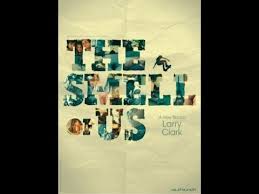
THE SMELL OF US
France, 2014, 92 minutes, Colour.
Lucas Ionesco, Diane Rouxel, Theo Cholbi, Hugo Behar- Thiniers, Larry Clark.
Directed by Larry Clark.
In 1995, photographer and artist, as well as film director, Larry Clark, created a cause celebre with his film Kids. It was a portrait of teenagers in New York City, their attitude towards life, some permissiveness, promiscuity, drugs… It alarmed many audiences, especially parents – and, by and large, parents were absent from the film. However, many involved in work with young people, teenagers, youngsters on the street, commented favourably on its presentation of the situations.
In succeeding years, Larry Clark was to make a number of films, which focused on young people, films like Bully and, becoming more explicit in the presentation of sexual scenes and nudity, Ken Park (2002).
20 years later he is back photographing youngsters in Paris, with the same themes, although there are some scenes with parents, some confronting their children, others being deliberately seductive, bizarre presentation of parents and adults. And Clark himself appears as a man on the streets, initially shown as lying on concrete, youngsters on their skateboards jumping over him, sometimes hitting him. They call him Rockstar. Later in the film, he sits with the young people and sings – but not a very sympathetic portrait of an adult.
The film focus on some of the skateboarders, two of them deciding that it must be easy to be male escorts and so go to hotels, use the Internet, and get clients – with some very ugly scenes of sexual encounters, especially a group humiliating a man who has become unconscious with his drink, painting his face, humiliating and ridiculing him. There is also a scene with another of the escorts, this time with a rather more sympathetic older woman who nevertheless exploits the young man
The central character, JP, is alienated from his family (and with the scene with his seductive mother later, it is no wonder) but he makes himself available as an escort, declaring he is not homosexual, and becoming friends with a young teenage girl with whom he has sexual relationships.
However, his close friend, Hugo, is infatuated with JP and is rejected by him, resorting to nude dancing with JP’s girlfriend, sexual encounters on the Internet, masturbation, and, ultimately killing himself.
Larry Clark might be a photographer, but his films do not show that he has a talent for narrative or interesting ways of putting stories together. We are shown sequences, suddenly cut off before they are completed, sudden shifts to other stories, no dramatic momentum or build-up, the closest being to Hugo’s suicide.
In many ways it is difficult to see the target audience for this film. Those interested in Larry Clark’s career will want to see it as a further film in his CV. Others may be pruriently curious and some of this curiosity will be satisfied – momentarily. But other audiences, who would be disgusted with the behaviour that they see, may accept that this is reality but have no particular desire to see it portrayed, especially in this way.
Published in Movie Reviews
Published in
Movie Reviews
Tagged under